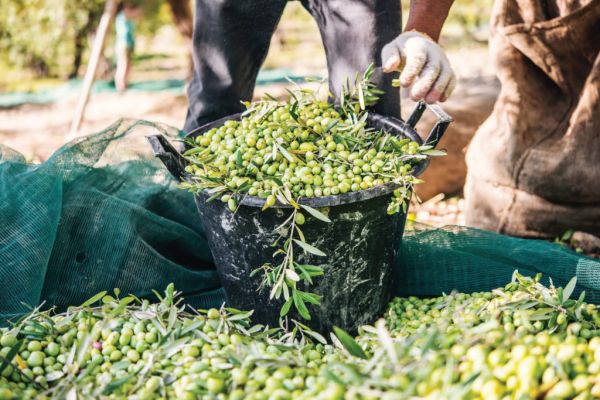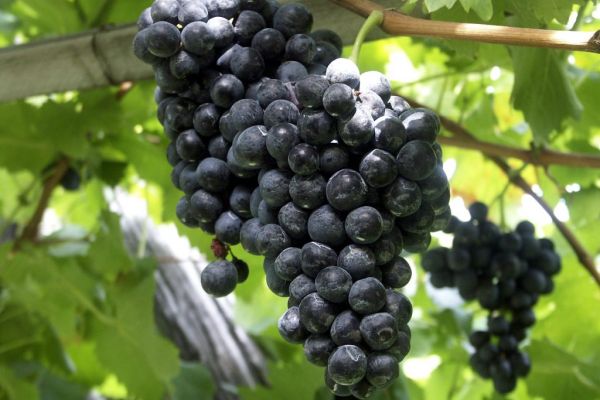Farmers in Spain and Italy are turning to techniques ancient and modern to safeguard production of regional favourites including olive oil and Prosecco as climate change forces them to rapidly adapt.
In the face of extreme weather that has caused billions of euros in losses in both countries, farmers in Spain are rapidly rediscovering the traditional use of crops planted between trees to protect the soil in olive groves, while Italian counterparts are harnessing technology to make best use of water resources.
Spain and Italy are the world's top producers of olive oil and but the industry is under threat from desertification and drought, with Madrid saying more than a fifth of its land is at high risk of becoming infertile.
Italy, renowned for wines and pasta wheat, suffered one of its most severe droughts in 70 years in 2022. This year has seen another scorching summer, punctuated by damaging hailstorms in the north, in line with scientists' predictions for climate change in the region.
The Italian farming industry is the European Union's third-largest in terms of production value, behind France and Germany but ahead of Spain, which is in fourth place.
Andrea Ronca, who grows cereals for his family's cattle farm in the province of Mantua in northern Italy, uses satellite images to track where his land is driest.
"I can adjust irrigation at any time, even from my smartphone, avoiding any wastage," says Ronca, 35.
Spanish farmer Miguel Moreno was an early adopter of so-called cover crops. He began growing grasses alongside trees almost 30 years ago to stop water draining away down the hill on his 74-hectare olive grove in the southern region of Andalusia.
His son, Angel, said that before that large cracks would form where the soil eroded.
"You had to be careful because you could fit your foot in them," he said.
Cover crops are now used on about 30% of olive groves in Spain, according to Spain's agriculture ministry, with scientists and companies expecting rapid growth in the next few years.
The changes are being driven both by European Union environmental incentives and stark realities. Spain's drought-hit olive oil production slumped to 663,000 tonnes last year, less than half the average of 1.45 million tons recorded in the previous four harvests, according to the government.
Spain's largest olive producers co-operative Dcoop said it expected a similarly low harvest for this year due to drought.
Wine output in Italy is forecast to fall 12% this year after extreme weather and fungal diseases hit vineyards, meaning Italy will lose its position as the world's largest wine producer to France.
Old Remedies
Scientists say restoring cover crops such as grasses and legumes in the rows between olive trees can act as a sponge to conserve water, prevent flash floods and restore nutrients.
In the short term, the practice may reduce yields but it can increase oil quality and protect soil for future harvests, a 2019 study in the Journal of Nutrition and Plant Science found.
Spain is already a pioneer in methods to save water, used in almost every stage of olive oil production, said Gonzalo Delacamara, director of the IE Centre for Water & Climate Adaptation in Madrid.
Cover crops "function as micro-reservoirs that mean each drop of rainwater stays on the ground longer before running off, so that water is more likely to penetrate," said Emilio Gonzalez, a professor in rural engineering at the University of Cordoba.
The bare soil still seen in most of southern Spain's olive orchards was not always the norm.
Tilling and clearing vegetation became widespread with the introduction of industrial pesticides and fertilisers in the 1960s and 1970s, said Antonio Manzaneda, professor in ecology at the University of Jaen.
The European Union has a target of reducing nutrient loss by 50% by 2030. In January, it began subsidising farmers who use cover crops as part of the new Common Agricultural Policy (CAP).
The practice can restore biodiversity including insects like the green lacewing, that in turn may help farmers control pests such as the olive fruit fly and the olive moth, Manzaneda said.
Olive farmer Angel said since introducing cover crops he noticed an increase in birds such as owls, blackbirds, turtle doves, hoopoes and reptiles such as the near-threatened ocellated lizard.
Consumer Pressure
Deoleo, the world's largest olive oil seller, bought 45% of its supply last year from growers who deploy sustainable practices including cover crops, Mariu Luchetti, Deoleo's global marketing director and head of sustainability, said in an interview.
She said the company was pushed both by customers such as Walmart in the US and by regulation to buy olive oil from producers using sustainable practices.
Swiss-headquartered agrichemicals and seeds group Syngenta began offering a cover crop seed mixture in Spain this year.
Next year, it expects the practice to increase exponentially "to combat the negative effects of drought," said Luis Miranda, head of sustainable agriculture for Syngenta in Spain.
Long periods of drought followed by torrential rains are one of the main ways soil is eroded.
At Domingo Albacete's olive farm soil erosion has left rivulets of rubble and stone. He now digs barriers with heavy machinery to catch rainwater in puddles that seep into the earth instead of stripping topsoil.
Ecology professor Manzaneda is also coordinator of EU-funded project SOIL O-LIVE and is testing methods for coaxing Albacete's degraded earth back to health.
In one, Manzaneda is applying charcoal made in an oxygen vacuum, a method used by pre-Columbian Indigenous people in the Amazon that tackles soil acidity and improves water and nutrient retention.
Italy Turns To Tech
In Italy, where practices like cover crops were already widespread, more farmers are now pioneering digital technology to give them an edge, especially in water conservation.
The extreme weather in 2022 caused damages estimated at €6 billion to farming, according to Italy's main farmers' lobby Coldiretti.
The share of land farmed using digital tools rose to 8% in 2022, from 6% the year before, while spending rose to 2.1 billion euros, from just 100 million euros in 2017, according to the Smart AgriFood Observatory of the Milan Polytechnic and the University of Brescia.
The change took time but has been driven by the need to save water in an increasingly dry country, said Professor Marco Trevisan, Dean of the Faculty of Agricultural Sciences at the Catholic University of Piacenza, and has been helped by a flowering of agri-tech start-ups.
"We were late because we were used to having lots of water at our disposal, especially in the north [of Italy]," he said.
Winemakers are among those adjusting to the new weather conditions.
"We are in the hills, where there is little water," says Simone Rech, who produces about 250,000 bottles a year mainly of Prosecco sparkling wine, in the province of Treviso, not far from Venice.
In Rech's vineyard, sensors now monitor the air and soil to gauge factors such as temperature and evaporation from the leaves, measures he says helped the vineyard withstand last year's drought. Rainwater and waste water from washing the cellar is collected, purified and reused.
Similar initiatives are being adopted by Catalonia's Cava producers in northern Spain.
On Italy's southern island of Sicily, Sebastiano Conti has helped reintroduce rice cultivation without flooding fields, relying on technology to create gentle slopes which can withstand the island's fierce climate.
"With laser-guided machines, we created millimetric inclines, which together with the type of soil we have allow us to grow rice using very little water," he said.














